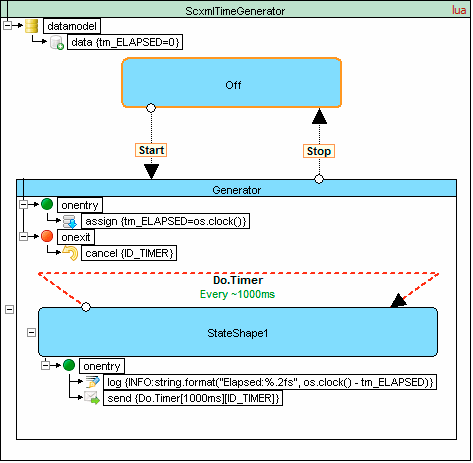SCXML-tutorial
| Contents | Overview | Examples | Editor | Forum |
|---|
<cancel>
The element is used to cancel a delayed <send> event. The SCXML Processor must not allow <cancel> to affect events that were not raised in the same session. The Processor should make its best attempt to cancel all delayed events with the specified id. Note, however, that it can not be guaranteed to succeed, for example if the event has already been delivered by the time the <cancel> tag executes.
Example:
<cancel sendid="ID_TIMER"/>

Attribute Details
| Name | Required | Attribute Constraints | Type | Default Value | Valid Values | Description |
|---|---|---|---|---|---|---|
| sendid | false | Must not occur with sendidexpr. | IDREF | none | The sendid of a delayed event | The ID of the event(s) to be cancelled. If multiple delayed events have this sendid, the Processor will cancel them all. |
| sendidexpr | false | Must not occur with sendid. | Value Expression | none | Any expression that evaluates to the ID of a delayed event | A dynamic alternative to ‘sendid’. If this attribute is present, the SCXML Processor must evaluate it when the parent <cancel> element is evaluated and treat the result as if it had been entered as the value of ‘sendid’. |
W3C IRP tests
1. Test 207
The SCXML Processor MUST NOT allow cancel to affect events that were not raised in the same session.


2. Test 208
The Processor SHOULD make its best attempt to cancel all delayed events with the specified id.

3. Test 210
If the 'sendidexpr' attribute is present, the SCXML Processor MUST evaluate it when the parent cancel element is evaluated and treat the result as if it had been entered as the value of 'sendid'.

| TOP | Contents | Overview | Examples | Editor | Forum |
|---|